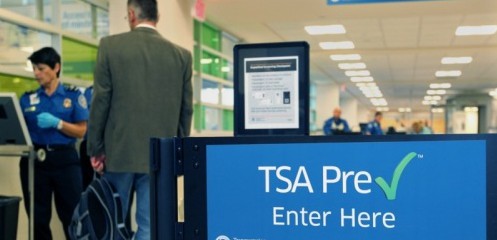
Despite legal obligations, the Transportation Security Administration (TSA) has delayed expanding its PreCheck program to underserved areas and reportedly opened itself to security breaches, earning the ire of two senators this week.
United States Sens. Gary Peters (D-MI) and John Thune (R-SD) recently wrote to TSA Administrator David Pekoske urging him to prioritize the program’s expansion and to account for reports that Clear Secure, Inc. (CLEAR), which provides biometric travel document verification systems and fast-tracks airline passengers through security checkpoints, had suffered security breaches.
“It is crucial that other transaction authority (OTA) agreements reached by TSA fully reflect congressional intent to expand PreCheck enrollment opportunities in new communities, particularly those in rural areas, through the use of innovative technologies and methods,” the senators wrote. “We are concerned that entities operating under OTA agreements are instead duplicating services already provided under the Universal Enrollment Services (UES) program. We are also concerned about reports of serious security breaches by CLEAR and request more information regarding how TSA is ensuring that CLEAR and other OTA providers maintain the highest security standards before executing OTA agreements with TSA.”
Thune was among the authors of the TSA Modernization Act of 2018 (S.1872), which ultimately passed as a part of the larger Federal Aviation Administration Reauthorization Act. That bill focused on security challenges faced by aviation and the surface transportation sectors at that time, but implementation of its demands has been plagued by delays. In 2021, the Department of Homeland Security’s (DHS) Office of Inspector General noted that TSA had likewise failed to implement all requirements of the law.
Within the provisions of that law were requirements that TSA create at least four private sector partnerships to expand passenger access to the TSA PreCheck program and get more travelers vetted in advance. It also set strict enrollment targets for those programs in succeeding years.
“We are concerned with TSA’s implementation of the TSA Modernization Act’s language aimed at expanding enrollment opportunities in areas which – due to geographical or other circumstances – lack accessible enrollment options,” the senators wrote.
Notably, they worried that agreements pursued by TSA have merely duplicated existing enrollment services, rather than expanded them to new areas. They don’t use novel approaches or technologies and still largely leave rural communities and other underserved areas behind.
As a result, the senators sought answers about CLEAR, TSA and its current methods within 30 days.




